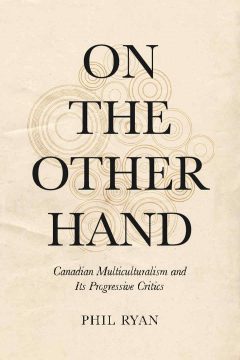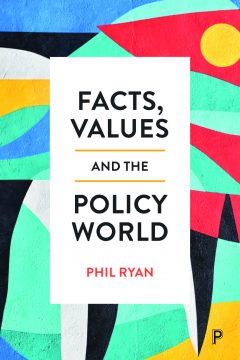New from University of Toronto Press:
On the other hand: Canadian multiculturalism and its progressive critics
From the Introduction:
In 1914, Henry Ford’s company created the Ford English School, to teach its immigrant workers, not just English, but the whole “American way of life.” In his 1922 classic, Public opinion, Walter Lippmann describes a July 4, 1917, graduation ceremony for the school, held at a baseball field:
In the center of the baseball park at second base stood a huge wooden and canvas pot. There were flights of steps up to the rim on two sides. After the audience had settled itself, and the band had played, a procession came through an opening at one side of the field. It was made up of men of all the foreign nationalities employed in the factories. They wore their native costumes, they were singing their national songs; they danced their folk dances, and carried the banners of all Europe. The master of ceremonies was the principal of the grade school dressed as Uncle Sam. He led them to the pot. He directed them up the steps to the rim, and inside. He called them out again on the other side. They came, dressed in derby hats, coats, pants, vest, stiff collar and polka-dot tie, undoubtedly, said my friend, each with an Eversharp pencil in his pocket, and all singing the Star-Spangled Banner.
Just as Henry Ford captured the spirit of industrial Fordism with his declaration that “Any customer can have a car painted any colour that he wants so long as it is black,” the “cultural Fordism” manifest in the ballpark suggests that you can be any colour you want so long as you “act white” – “white” in this case being narrowly identified with the dominant anglo-Protestant group of Ford’s time. And cultural Fordism, like its industrial counterpart, could be found in many countries.
The anti-Ford vision of multiculturalism. For many of its supporters, Canadian multiculturalism was a wager that society did not have to be like this. It was a hope that we could build a society in which people who had come from all corners of the earth could fully participate, without first erasing themselves, in which everyone could “act as full and equal citizens in political life, without having to hide or deny their ethnocultural identity” (Kymlicka). It was a wager that we could build a society in which people don’t assume you are from somewhere else, just because your skin is not quite the same colour as theirs, or your last name is not Smith or Gagnon (or Ryan for that matter); a society where you don’t have to change your name, or ditch your turban, your yarmulka, or your hijab, in order to participate on an equal basis in the workplace; a society where kids don’t make fun of you in the schoolyard because your lunch is different from theirs.
And it was a wager that such a society could be vibrant and unified.
Let us call this the “anti-Ford vision” of multiculturalism. Note its two-sided nature. It’s about personal integrity: not having to betray yourself, not having to deny your own history, not feeling shame of your parents and grand-parents. It’s also about making it easier for people to participate in the central aspects of Canadian life: to take part in public education, politics, the economy, without feeling that you’re intruding in an alien space that belongs to someone else.
Conservative fears. For many of Canadian multiculturalism’s opponents, this was a dangerous aspiration, corrosive of the unity any society needs. For Neil Bissoondath, the most influential of these critics, multiculturalism promoted an “obsessively backward gaze” (1994, 110); it would lead to “imported Old World feuds” (124), and “a slide into ethical chaos” (143). In sum, the “centre of the nation’s being” would be “challenged, even effaced” by multiculturalism (45).
This style of critique was analysed at length in my Multicultiphobia (2010b). I argued there that conservative arguments were generally ill-formulated, blamed multiculturalism for phenomena that clearly predate it, and paid little attention to actual multicultural policies, among other shortcomings.
Progressive critiques. But there is a very different type of critique of the multicultural vision presented above. In this view, far from constituting a threat to “our civilization,” multiculturalism is trivial and ineffective, or worse. The vision is not sufficiently transformative: it simply leaves too much of our unjust world untouched.
Some key progressive critiques of multiculturalism that are taken up in this book can be introduced in the form of questions, questions not addressed in the anti-Ford vision. It is fine to say that identity does not have to be completely erased, but how much does get erased de facto, and how does this come about? How closely linked, for example, is a person’s identity to their mother tongue? And if that mother tongue is not one of our official languages, what supports for its survival are part of the multicultural vision? Canada has made massive investments to promote learning of our official languages. Does the multicultural vision call for equivalent support for other languages? If not, how are they to survive? Will they generally be transmitted only within the family, and through additional weekend classes in schools and church basements? What incentives will the child have to learn the language? And what incentives will they have not to learn it (for those pressures are quite real as well)?
And how does the anti-Ford vision address various other painful experiences of minorities? Does greater openness to “difference” somehow overcome discrimination in the workplace? Does it improve the structural location of immigrants in the economy?
And what does the live-and-let-live “recognition” expressed in the anti-Ford vision of multiculturalism do to people’s understanding of the realities around them? Could it perhaps even serve to mask power inequalities? Frantz Fanon commented that, at a certain point in the national liberation struggle, the colonists will seek to “humanize” their domination, deploying various signs of “politeness and consideration,” such as addressing the colonized as “Monsieur ou Madame” (1968, 88). Such “recognition” does not constitute liberation, it is a prophylactic against it. Is this the case for multicultural “recognition” as well?
And how might the anti-Ford vision affect the privileged elites’ understanding of reality? Might it allow them to give themselves a psychic pat on the back, imagining that the full requirements of justice have been met and that they need trouble themselves no further? Or maybe the whole contrast between multiculturalism and the American melting pot is just more fuel for Canadian smugness, akin to the sense of superiority we gain from observing America’s gun carnage.
On the other hand is available here. An overview, with link to the whole introduction, is available here.
Now available in paperback:
Facts, values, and the policy world
“Many policy analysts – and citizens interested in public issues – believe that rigorous thought should be uncontaminated by values, which are merely subjective. Policy analysis, however, is about what is worth doing and therefore inherently values based.
This accessible book reveals the damage that this contradiction inflicts on policy analysis and society. It also demonstrates the real-world failings of various influential alternatives to the ‘value-free’ ideal. By showing that values are amenable to critical analysis, this book provides a solid foundation for a comprehensive approach that reimagines the scope and role of policy analysis in contemporary society.”
“Phil Ryan makes a strong case for rejecting the common view that values are beyond reason and that policy analysts should abstain from making judgements of value in their work.” Andrew Sayer, Lancaster University
“An important, persuasive and much needed challenge to a long-standing and deeply entrenched orthodoxy in policy analysis. I enthusiastically recommend it to all who teach in this field.” Maurice L. Wade, Trinity College
“This riveting read offers a ‘dialogical way’ through the tangles of the fact/value dichotomy that often leaves policy makers and analysts powerless in the face of disagreement.” Susan T. Gardner, Capilano University
The annotated contents for Facts, values, and the policy world can be viewed here. The book can be ordered here.
Main Lines of Research
In recent years, my writing and research have been focussed on three broad themes: multiculturalism, debates concerning religion and democracy, and the problem of facts and values in the social sciences and the policy world.  The thread that unites these themes is an effort to reaffirm the value of respectful dialogue in a climate of polarization, and to challenge the latter’s intellectual underpinnings.
The thread that unites these themes is an effort to reaffirm the value of respectful dialogue in a climate of polarization, and to challenge the latter’s intellectual underpinnings.
Multicultiphobia (2010) seeks to refocus and reinvigorate debate, not just on multiculturalism, but on the core norms of Canadian society. I followed that with various shorter pieces on multiculturalism. And as noted above, I have now published an examination of progressive critiques of multiculturalism, to complement Multicultiphobia‘s deliberately one-sided focus on conservative critics of Canadian multiculturalism.
After the ‘New Atheist’ debate (University of Toronto Press, 2014) attempts something analogous, in relation to a phenomenon that garnered significant media attention: the rise of the so-called “New Atheists” and the widespread backlash against them. By de-constructing this heated debate, this work seeks to help restore a space of social dialogue. An important section of the book seeks to demonstrate the pluralistic and dialogic basis of social norms, thus seeking to counter both the New Atheist claim that “science” alone can be the basis of ethics, and the firm conviction among opponents of the New Atheists that all sound morality must be theistic.
The work on facts and values, for its part, addresses the “non-cognitivist” view of norms as mere preferences that are beyond rational analysis. The ongoing project has a double target: the fact-value dichotomy often associated with “traditional” social science, and influential alternatives to that dichotomy that appear more progressive, yet have unfortunate alignments with the current miasma of “post-truth politics” and “alternative facts.” It thus takes aim at some of the intellectual foundations of our current political crises.
“Could you really persuade, if we don’t listen?”, a November 2013 talk I gave at Simon Fraser University, presents the links between these research themes in greater detail.


